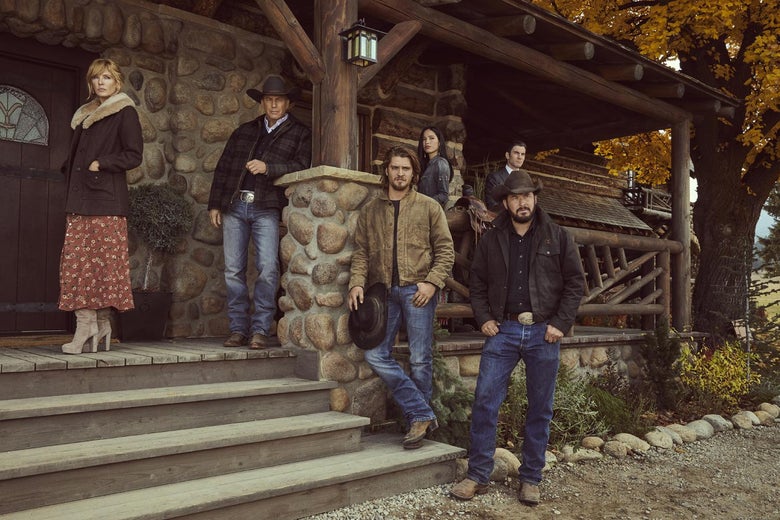And for a big, beautiful drama starring Kevin Costner as patriarch of the Dutton ranching family and co-created by Taylor Sheridan, whose movies Sicario, Hell or High Water, and Wind River have won varying degrees of critical acclaim, it is a little surprising how absent Yellowstone feels from the Online Discourse.
Everyone in the show’s universe is obsessed with history—mainly with the idea that the Dutton family’s way of life, as owners of a giant ranch adjacent to Yellowstone National Park, employers of many cowboys, and wielders of various kinds of local power, is deeply correct.
In Season 4’s opening episode, John lies in a coma in a hospital bed, shot multiple times by gunmen hired by his adopted son’s biological father to murder the entire family, so that the adopted son can have the ranch.
I gasped—then cried—at the end of a first-season Yellowstone episode where the camera follows Costner, pondering all his troubles, across the ranch, and the soundtrack plays Mary Gauthier’s song “Mercy Now”: “My father could use a little mercy now/ The fruits of his labor fall and rot slowly on the ground/ His work is almost over, it won’t be long, he won’t be around/ I love my father, he could use some mercy now.” We, the viewers, are supposed to have mercy on John; deep in his heart, he means well.
This patriarchal allegiance has a politics to it, especially in the West, where land is everything.
I almost stopped watching Yellowstone in the first season because of a series of events in which Kayce, the youngest Dutton and a former Navy Seal , who is married to Monica, a Native woman played by Kelsey Asbille, shoots his own wife’s brother in the course of a conflict between the Dutton family and the reservation.
This Native child’s pain and trauma is in the story so that we can see Kayce’s reaction and think about his guilt; so that Kayce and Monica’s decision to move their son away from the reservation makes sense; and so that an alienation between Kayce and Monica can arise and eventually be solved.
In the first season, a California billionaire who has been trying to take over the Duttons’ ranch dies, gasping out, “I have every right to be here; this is America.” But he and his ilk obviously do not, since they died, and it’s the strong who survive.
I have seen three episodes of 1883, and so far, it seems like the show has the same mystical sense that there are white people who earn the right to the land, and white people who don’t—plus Native people, who will be pushed aside, in the sad course of Progress.
I’ll watch the rest of 1883 with interest, wondering how this show will continue to turn the rhetorical trick of Yellowstone, which critiques and celebrates the settler-colonial success of the Duttons, sometimes in the very same scene.
Here’s an example as to why: In a press release about the show’s still-in-the-works second spinoff, 6666—another contemporary Western about a giant ranch in Texas that is a county to itself and “still operates as it did two centuries before”—Paramount+ described the 6666 ranch’s name as “synonymous with the merciless endeavor to raise the finest horses and livestock in the world.” It’s that lack of mercy for most everyone who’s not a Dutton—or at least, Dutton-esque—that underpins life on Yellowstone.
